Gangnam: The scandal rocking the playground of K-pop
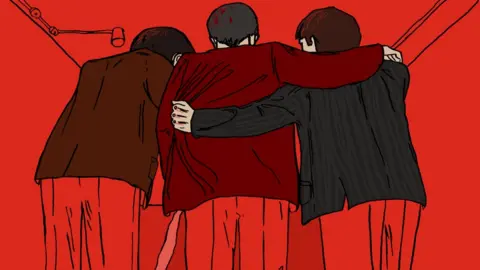 BBC
BBCEarlier this year, the meticulously managed world of K-pop was rocked by scandal.
Seungri, a singer in one of the world's most famous boy bands, Big Bang, was questioned by police over allegations he was procuring prostitutes for his business and had embezzled funds at Burning Sun, a nightclub he part-owned in the exclusive Gangnam district of Seoul, South Korea.
Several of his celebrity K-pop friends were also caught sharing sex videos and bragging in a chat room about raping women. One by one, Korean heartthrobs more used to being mobbed by fans found themselves fending off reporters as they made their way to the police station to face questions from drug-taking to rape.
But in recent months an even more shocking picture has emerged of Gangnam, where South Korea's high society live, work and play. The BBC has heard allegations that in its glitzy nightclubs, women have been drugged to order by powerful men and raped, and that underage girls are being sexually exploited for profit.
The BBC has sought the voices of those caught up in Seoul's sex scandal. We have heard from club-goers and club employees as well as victims, including underage girls who say they were recruited to have sex with paying customers. They all say the abuse of women in the clubs is pervasive and often violent.
We have been told that elite clients, known as VIPs - and the richest VVIPs - were prepared to pay tens of thousands of dollars to have women who were enjoying a night out drugged and taken to a nearby hotel room, the abuse routinely captured on camera.
As one club-goer put it to us: "These men are hunters and they pay to get in the game. So you need prey. It's foolish to think you won't get shot in this place."
A warning: this article contains details of alleged sexual assaults which you may find upsetting.
'He kept giving me water'
We were shown a harrowing video which allegedly depicts a sexual assault. The still image in front of me gives me an idea of the horror which will follow.
A woman is lying naked on a red sofa with three men staring down at her. I press play, and the men approach her. One laughs as he lifts up a limb and it falls. Her body is limp and she does not respond. The two minute video is too upsetting to describe in detail.
She appears to be sexually assaulted by all three men. Repeatedly.
The video was allegedly shared in a chat room between employees - I cannot verify its contents. But this clip is now part of a police investigation into activities at several clubs in Gangnam.
Gangnam has often been described as the Beverly Hills of Seoul. Flashy and fashion-conscious, it's a symbol of prosperity and status. At night, it's the neon playground of the very rich and those eager for a taste of the celebrity lifestyle.
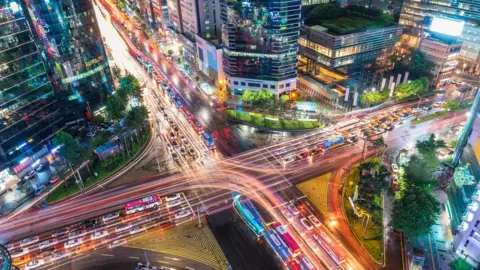 Getty Images
Getty ImagesThe cost of a night out appears almost irrelevant. One wealthy, connected club-goer told us he spent up to $17,000 (£13,300) on just one evening. A viral social media clip shows a man spinning on the dance floor, throwing bank notes into the air like confetti. The décor is loud and ostentatious. The dress code is, of course, designer chic and for many of the more prestigious nightclubs, gaining entry requires being on an approved list.
DJs are celebrities in their own right, conducting crowds of dancers crammed around the turntables. Beautiful women serve thousand-dollar bottles of champagne to revellers who appear ready to party until dawn.
Kim - not her real name - used to be a regular on the Gangnam scene. She liked to dance and she had a few favourite DJs. One evening last December she was invited to a nightclub for drinks.
Among the group was an Asian businessman who she claims took an interest in her and began serving her whisky.
"When he was pouring the drink, I couldn't see him," she says. "He had his back against me. So I drank around three to four glasses. Every time I did so, he kept giving me water to drink."
At some point, she claims, she blacked out and woke up in a hotel room with the man looking down on her.
"He forced me to lie down but I didn't want to, so I kept getting up. When I got up, he would grab my neck and force me down on the bed over and over. I thought someone could die like this by having their neck broken.
"I started crying and yelling. Then, he got on top of me and used both of his hands to block my mouth and started pressing down hard. He kept saying 'relax, relax'."
She told us she feared for her life. "I couldn't resist his power and I was in so much pain that I could die, so I just gave up and lay there like a dead body."
Kim says she had been drugged in the club and was raped. Afterwards she threw up, then begged to go home.
"I was grabbing my clothes and other things to leave when he took his phone to take a photo with his face and my face in it. I said what are you doing and 'no, no'. But he grabbed my arm and wouldn't let me go. So I thought it'd be best to just take this photo and leave otherwise I could get into some real harm.
"So he just took the photo and I left."
Kim went to the police the next day. They found no trace of drugs in her blood, but prosecutors tell us that is not unusual. The most common drug used to incapacitate a victim is thought to be GHB, or Gamma-Hydroxybutyrate a strong sedative that is undetectable in the body after a few hours.
"Thankfully I was awake when it happened and I can fully describe what I dealt with," she told us.
But she said she had found other women online who also believe they were drugged and raped after visiting Gangnam clubs, but have no clear memory of what happened.
The businessman was found and questioned but he has strongly protested his innocence. In a statement to the BBC he said she did not black out. He said he did not rape, sexually assault or physically assault her at all and that CCTV footage shows her willingly leaving the club with him and walking to the hotel.
The investigation continues.
'Bring me zombies'
Over the past few months, police have questioned nearly 4,000 people, focusing on allegations of drugs, prostitution, sexual assault and illicit filming linked to the club scene which have outraged the public. Those questioned include several male celebrities from the K-pop scene.
Seungri - real name Lee Seung-hyun - has resigned from show business, denying that he ever procured prostitutes but saying the scandal "has become so big".
The continuing controversy has led to the resignation of the head of a major South Korean entertainment company - Yang Hyun-suk, chief producer of YG Entertainment, which was behind the viral hit Gangnam Style. He denied wrongdoing, but said he could no longer withstand "humiliating" allegations of his involvement in a drug scandal and was stepping down to fight them.
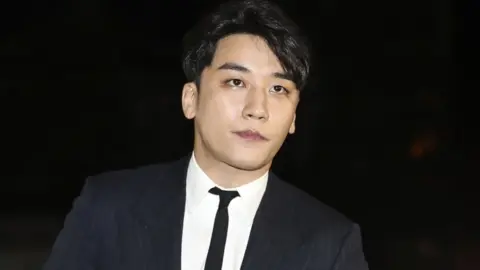 Getty Images
Getty ImagesThe allegations have encouraged others to speak out. People we spoke to who were an integral part of Seoul's club scene have described a culture of exploitation, where the procuring of women for sexual gratification had become almost routine for some wealthy clients.
The clubs employ hosts known as "MDs" to cater to guests' desires. It's a murky role - one female MD told us it entailed building relationships with "pretty girls" to bring them into the clubs. They would entice them with the offer of free entry and free drinks.
MDs would have a number of beautiful women on their call lists. Many would encourage them to drink with their clients and the MDs would then take around 13-15% of the drinks sale. With the right clients, some of them would make around $20,000 a month. As one MD put it: "To secure high-paying clients, MDs need to be able to supply hot girls."
We have heard repeated allegations that at some point and at the request of clients, the women's drinks were being spiked, rendering them unconscious. However one senior club executive told the BBC that the suggestion GHB had been sold or distributed to customers and sexual assault encouraged was ridiculous.
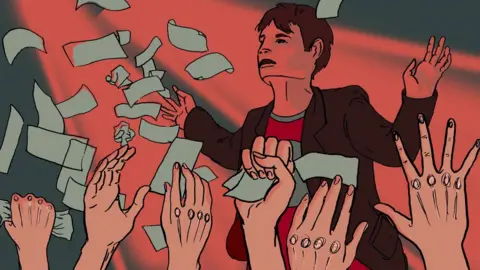 BBC
BBCA former host at a famous Gangnam nightclub said one VVIP - the elite guests - was "well-known for his crazy appetite for unconscious women".
"He ordered me to bring two totally drunk or unconscious women to him," he told us. Specifically, he said, the client's request was: "Bring me zombies."
He claimed to have witnessed several attempted sexual assaults: "I saw a few people every week that didn't seem like they were drunk, but gone in a different way. You can tell with your eyes the difference between who is drunk on alcohol and who is gone from something else."
Lee - not his real name - worked as an MD and said these women were "just people who came to the club".
I wanted to ensure I understood what he was telling me. So I put the question to him clearly: "Ordinary women going into the club for a nice night out, could face being drugged and raped? Is that what you saw?"
"Yes," came the reply.
After procuring the women, he said, the clients "would usually take them to the hotel above the club or there are a lot of hotels near here, or motels".
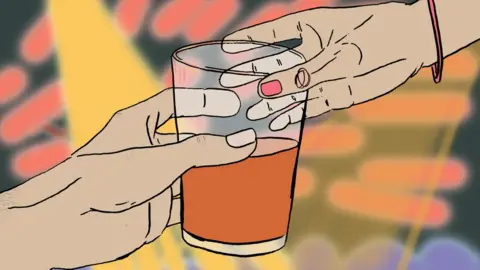 BBC
BBCWe cannot name any of these workers, because they fear reprisals. Likewise a regular club-goer told us that he had been in the VIP room at a Seoul nightclub when a waiter brought in unconscious women.
"I don't know if someone drugged her but I had a woman who was clearly hallucinating and unconscious. I wondered if she was mentally ill, especially since she was drooling and her body was limp. I worried - what if she dies here?"
He denies being involved in drugging or attacking women and said he had challenged the host.
"I told the waiter that she is too drunk, and he said: 'She's not drunk. She won't remember a thing so you can do whatever you want.'
"Sexy, beautiful women are the prey. These men are the hunters. And they pay to get in the game. So you need prey, and the MDs are the ones who release the prey."
A pastor undercover
Joo Won-gyu is a church pastor who has become one of the most vocal campaigners against sexual violence in Gangnam.
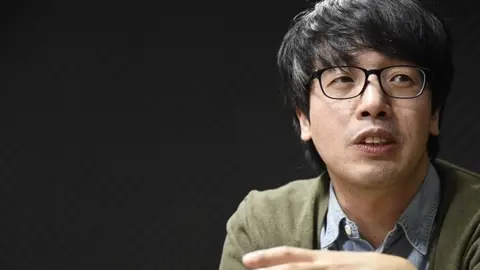 Pastor Joo Won-kyu
Pastor Joo Won-kyuHe had been working with runaway teenagers in 2015 when 20 of them disappeared. He tracked them down and found them working as underage prostitutes at clubs. He decided to become a driver for some of these clubs to try to discover more about how these teenagers were being treated and recruited.
He said scouts or pimps would entice runaway teenage girls by claiming they would help them become entertainers or actresses after "working" at the club for two to three years. Others were even promised plastic surgery.
One of the youngest girls working in clubs had been recruited at the age of 13, he claims. The age of consent is 20 in South Korea. Sex with a minor is statutory rape.
He said he had witnessed a number of unconscious women being raped in that time. He told us how he believed the system worked.
"VIPs would tell MDs 'I want to sleep with that girl'. The MD would then tell the girl 'that VIP is super-rich' and then the MD would take the girl into the partitioned area. Then they would drink together, put GHB in the drink or actually get her drunk on alcohol to rape or sexually assault her."
He drove us around the back alleys of Gangnam where he would drop off clients or sex workers, including underage girls, at hotels or office apartments. He described it as a "challenging time".
"I saw women raped inside clubs, raped outside clubs behind cars, being drugged against their will, being beaten and so on. I would say three to four times a week I'd see this."
'We gave our bodies in rotation'
Joo tried but failed to remove several girls from these clubs. He would not let us meet any of them, but allowed us to put questions to two of them by phone, through him.
One who was recruited for clubs at the age of 16 was very blunt about her role.
"When we were there we were drinking, taking drugs, dancing like idiots and we gave our bodies in rotation," she said.


She said the men were "like kings". Both teenagers said the sex was often violent - they and their friends would need medical treatment.
Her clients often filmed her. She was told to act innocently, and sometimes she was to act as if she was being raped.
"For girls like us they'd make porn out of it… I just act like I don't see it when they film me."
Joo says these videos could be used to blackmail the young girls to prevent them from leaving the club's service, or to stop them going to the police.
The minors said that on many occasions they were not alone with these men in the motel rooms.
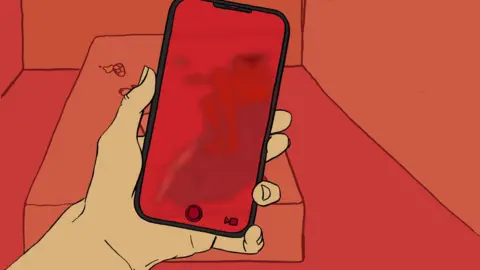 BBC
BBCOne told us the VVIPs would bring along women they'd picked up at clubs who had been drugged and they would witness them being assaulted or raped.
Some girls were lured with marijuana, they said, but if the men "think it could be a crazy bitch that could sue them, then they would drug them with GHB and film them unknowingly".
"They are just unconscious. They cannot get a grip. Or they have no idea what they did."
Now that the police investigation is under way, I asked one, through the Pastor, what she would like to see happen to those involved in this sex scandal.
"I hope they all die," she said.
"Only those who have a… strong mind survive following Gangnam."
'Sexy beautiful women are prey'
Prostitution is illegal in South Korea, and yet the sex trade is thriving and thought to be worth around $13bn a year. There is no shortage of prostitutes, for those who want such services.
But one rich club client told us that the men he knew did not want a prostitute. He said comparing prostitutes to ordinary women was "like a business car versus your own car".
"You cannot touch a normal girl like that easily. The sense of achievement follows when you gain access to certain things that not everyone is allowed to."
We challenged him that having sex with women who are unable to give consent was rape.
"Normal women who drink normally will not take off their undies? So what do men do?" he answered indignantly. "They try to make them drunk, but they refuse. What do you do?
"You say innocently that 'I'm only here to dance. Sure, but will people let you only dance? This is a jungle. It's right that you are here to sightsee, but there are alligators, lions and lizards out to get you. Sexy beautiful women are prey."
'Screaming testimonies of women'
The idea of being preyed upon by men will feel disturbingly familiar to so many women in South Korea. Last year, thousands took to the streets of Seoul to protest at so called "spy cameras", where videos of women, often sexually explicit, were taken without their knowledge.
The scandal has prompted further large protests as campaigners call for justice. They fear that police cannot be trusted to investigate fairly.
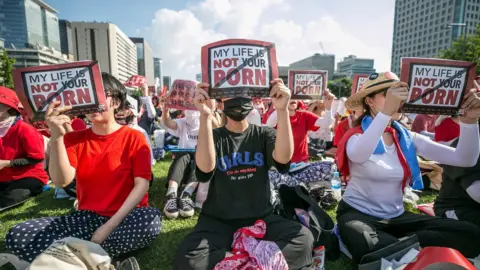 Getty Images
Getty ImagesShin Ji-ye from the Green Party addressed the last mass rally on International Women's Day in March and claimed this abuse had taken place over "decades".
"In so many clubs," she said, "we have heard the screaming testimonies of women being raped and assaulted."
But there is anger that it was only when celebrities were arrested and police collusion was suspected that action was taken. There is fear that the voices of female victims have been ignored for too long.
Police have arrested 354 people in the last three months in connection with what has become known as The Burning Sun Scandal. Of them, 87 were arrested for brokering sex, secretly filming sex and rape. In 20 cases women had been drugged.
But campaigners say the total number of female victims may be much higher. Lawyer Cha Mee-kyung says such "hidden crimes" happen but "are not reflected in justice system statistics".
There are also claims that some police officers turned a blind eye to reports about the nightclubs.
President Moon Jae-in has ordered an investigation into alleged police corruption and said there was "evidence suggesting that the prosecutors and police purposely conducted incomplete investigations, and actively prevented the truth from being revealed". The Gangnam station chief has been removed from his position after a special inquiry.
Reporting a rape can be hard for victims. Many women in South Korea are reluctant to come forward. They fear the stigma. They believe they will be judged by an extremely patriarchal society.
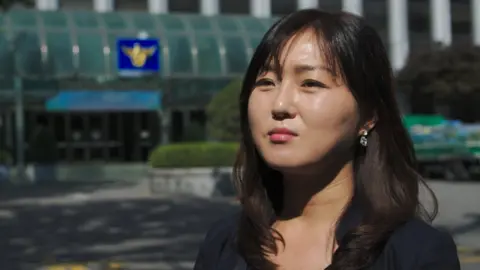 BBC
BBCThe use of drugs also makes it difficult for women to remember the details of an assault.
Lawyer Kim Jeong-hwan is in the process of trying to bring to court South Korea's first case involving GHB. He said the nature of GHB meant it was "highly likely the victims would not have a clear recollection" of the night.
"On top of that it is hard to secure evidence that GHB has been used as it is extremely unlikely that a blood test will detect the drug because it disappears so quickly from the body," he added.
Then there is the fear of not being believed. It is their word against the rich and the powerful. Will a police force, which is already being accused of trying to cover up some of these crimes, be able to hold those in positions of power accountable?
The Korean National Police Agency has set up a special unit to investigate crimes against women. Supt Choi Hyun-a told the BBC that her officers would "thoroughly and fairly investigate so that all South Korean citizens had a greater trust in the police".
She added that her team would focus its efforts on "preventing sex crimes where women are drugged".
"We know this frightens women the most," she said.
Some women are concerned that once this controversy has passed, the exploitation will continue. But campaigners have vowed to fight on.
Kim told me that she had never before thought of herself as a feminist or a fighter. After her alleged rape, that has changed.
"I really wanted to catch these evil men. I want the law to change. I want a society where these drugs can't be used and where no more victims are created."
Correction 5 August 2019: An earlier version of this story incorrectly said the age of consent is 18 in South Korea.
If you have been affected by sexual abuse or violence, help and support is available at BBC Action Line.
Illustrations by Emma Russell
